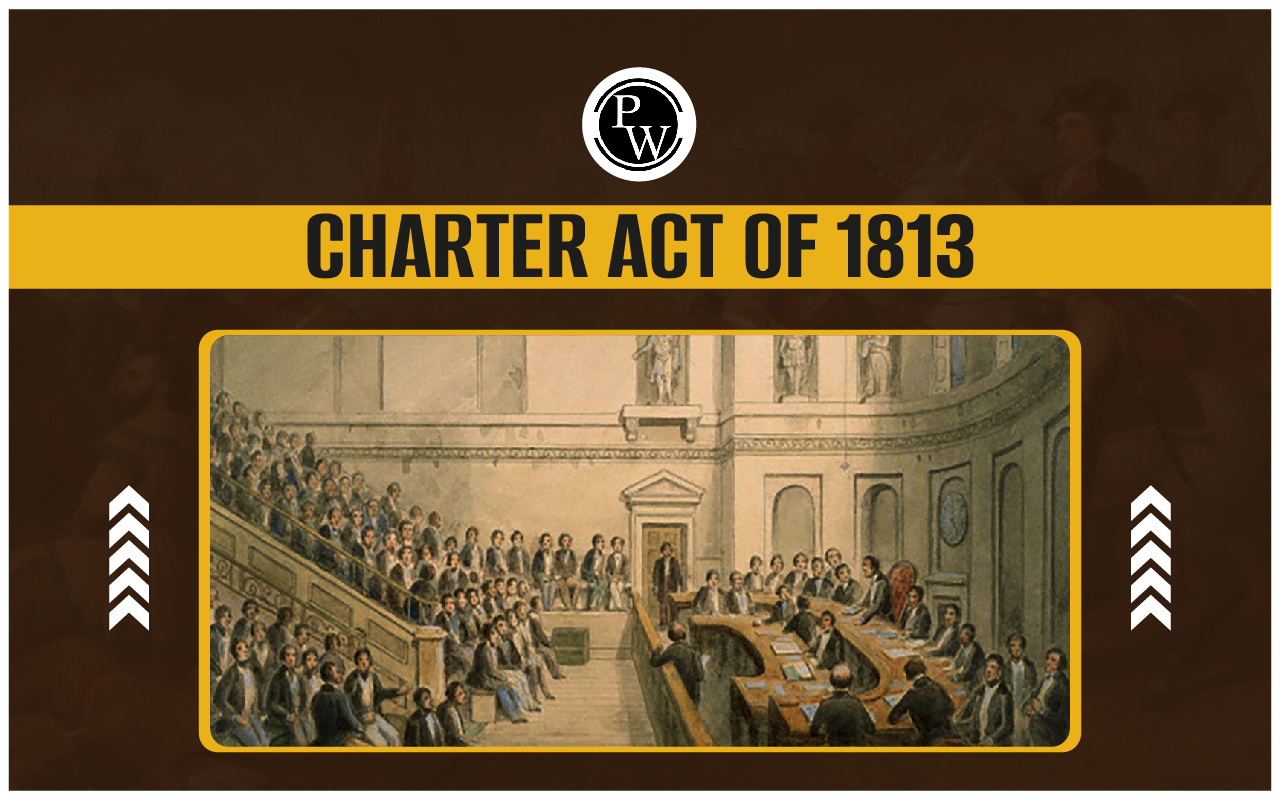
Charter Act of 1813: The Charter Act of 1813 was a significant move by the British Parliament to extend the East India Company's authority for an additional 20 years. Sometimes referred to as the East India Company Act of 1813, it holds importance for establishing the legal status of British-controlled territories in India. This act marked a defining moment as it outlined the constitutional framework for the British Indian regions.
In essence, the British Parliament renewed the Charter, essentially prolonging the British East India Company's governance in India. However, this renewal came with changes. The Act limited the company's commercial activities, allowing trade only in tea, opium, and with China. Other commercial ventures undertaken by the company were terminated. Look into the Charter Act of 1813, it's crucial to understand its historical background and the specific provisions laid out within this legislative act. This legislation had a lasting impact on the governance and trade policies in India during that time.Charter Act of 1813
The Charter Act of 1813, also known as the East India Company Act of 1813, was a significant step in the rule of the British East India Company in India. This act, passed by the United Kingdom's parliament, marked a shift in the company's commercial activities, limiting them to trading in opium and tea while maintaining trade with China. Additionally, it allocated 100,000 rupees for Indian education and allowed Christian missionaries to teach English and their religion. Two key changes highlighted by historian and literary critic Gauri Viswanathan were the British taking responsibility for educating Indians and relaxing control over missionary activities. Previously, education provision fell under the governor-general of Bengal. This act aimed to show the obligation of the British towards the well-being of the Indian populace, addressing moral and religious support that the British state was unable to provide at that time. Before this act, the British Parliament and the East India Company had rejected missionary activities, imposed restrictions on religious education, and barred the Bible. There was a fear that exposing Indians to Christianity might threaten British commercial interests. The renewal of the company's charter had occurred previously in 1793 and later in 1833. This act was pivotal in reshaping the British approach to governance and education in India.Charter Act of 1813 Overview
Go through the Charter Act of 1813 Overview for easy and quick understanding.|
Charter Act of 1813 Overview |
|
| Long Title | An Act for continuing in the East India Company, for a further Term, the Possession of the British Territories in India, together with certain exclusive Privileges; for establishing further Regulations for the Government of the said Territories, and the better Administration of Justice within the same; and for regulating the Trade to and from the Places within the Limits of the said Company’s Charter |
| Territorial Extent | Territories under direct British control |
| Also Known as | East India Company Act, 1813 |
| Introduced by | Parliament of United Kingdom |
| Royal Assent | 21 July 1813 |
| Governor General | Lord Hastings |
| Status | Repealed by Government of India Act, 1915 |
Charter Act 1813 History
Napoleon Bonaparte, a historical figure, made rules called the Berlin Decree of 1806 and the Milan Decree of 1807. These rules said that countries in Europe linked to or working with France couldn't bring in goods from Britain. This created something called the Continental System in Europe. British traders had a tough time because of this. They wanted to sell things in places like Asia, which was under the control of the British East India Company. Around this time, people were talking about something called the Laissez-faire policy by Adam Smith. This was about letting people do business freely without a lot of government involvement. Because of the Continental System and this new way of thinking about trade, the traders pushed to end the East India Company's control. In 1813, the United Kingdom's Parliament passed the Charter Act of 1813. This Act was about giving the East India Company control over British territories in India for a while longer, but it also changed things. It stopped the East India Company from having total control over trade in India. So basically, these rules by Napoleon, mixed with new ideas about free trade, led to changes in how business was done in India, especially with the East India Company losing its monopoly.Charter Act of 1813 Provisions
This law confirmed that the British government had full control over their possessions in India. It allowed the company ruling India to continue for another 20 years. They could no longer monopolise trade, except for tea, opium, and with China. Local governments gained the authority to tax people under the Supreme Court's jurisdiction. The company's profits were set at 10.5%. The law also expanded the powers of Indian courts over British citizens. The Act permitted missionaries to come to India and spread their religious beliefs. It even led to the appointment of a Bishop for British India with headquarters in Calcutta. Furthermore, it allocated funds to revive Indian literature and support scientific advancement. Additionally, the company was directed to play a larger role in educating Indians, setting aside Rs.1 Lakh for this purpose.Charter Act of 1813 Features
The Charter Act of 1813 made big changes in how the East India Company controlled India. Before this, the Company had a lot of power, but this Act started breaking that power. Even though it took away some control, the Company still had a monopoly on trading tea, opium, and doing business with China. The Act also added 20 more years to the Company's rule. This Act also confirmed the Crown's control over British colonies in India. It allowed Christian missionaries to come to India to spread their religion and help with moral growth. Municipal governments got the power to collect taxes from people, but the Supreme Court had to oversee this. It also gave more authority to Indian courts over British folks in Europe. If someone didn't pay their taxes, they faced penalties under this Act. It controlled how much money the Company made from its territories and businesses. The Company had to give a fixed percentage, 10.5%, of its profits to its shareholders. The Act made sure the Company kept separate accounts for its businesses and territories. Also, it required the Company to spend a specific amount of money each year on educating Indians. Plus, it set up a program that rewarded research and helped bring back Indian literature.Charter Act 1813 Significance
The company's investors in India received a dividend of 10.5%. The East India Company had to ensure control over territories and profits for another 20 years without challenging the British Crown's power. This marked the first clear explanation of how British colonies in India fit into the constitution. The Board of Control gained more authority. A yearly fund of one lakh rupees was designated for the advancement of Indian literature, education, and science. This was an important commitment to education by the government. Now, the British Parliament needed to approve the rules of the councils in Madras, Bombay, and Calcutta. This step established the constitutional status of British territories in India. Money from territories and business was to be kept separately. The Board of Control's power to oversee and guide was made clearer and stronger. Also, Christian missionaries were allowed to spread their religion in India.Charter Act 1813 Importance
The Charter Act of 1813 was highly significant for several reasons:- It confirmed that the British Crown had control over its territories in India.
- It put an end to the East India Company's exclusive control in India.
- This Act also granted authority to local administrations to levy taxes on the people within the oversight of the Supreme Court.
Charter Act of 1813 Governor General
Lord Minto was in charge of India as the Governor General during the time when the Charter Act of 1813 was in effect. Before this, he was elected as the President of the Board of Control in 1806 and later became the Governor-General of India in 1807. He stayed in this position until October 1813. Minto aimed to make changes in the media and education systems because he wanted to improve how India was governed. The Charter Act of 1813 regulated the company's income from territories and business profits. There was a request for the company to keep separate accounts for its business and territorial incomes. He returned to England in December 1813, and the next year, he was given the title of Earl. After his passing on June 21, 1814, the Governor General under the 1813 Charter Act was laid to rest in Westminster Abbey. To succeed in upcoming exams, candidates should consider exploring PW SSC Books We provide high-quality content at an affordable price, including sample papers, mock tests, guidance sessions, and more to ensure aspirants secure their selection. Also, enroll today on SSC Online Coaching to turn your dreams into reality.| Other Related Links | |
| Tiger Reserves in India | National Parks in India |
| Biosphere Reserves in India | Elephant Reserves in India |
Charter Act of 1813 FAQs
Q1. What were the main features of the Charter Act of 1813?
Ans. End of Company’s Monopoly over Trade is one of the Charter Act of 1813’s main feature.
Q2. When was the Charter Act 1813 passed?
Ans. Charter Act 1813 was passed on 22 July 1813.
Q3. Who was the chairman of Charter Act 1813?
Ans. According to the act, any law passed in India had to be presented to the British Parliament and given the title “Act.” An Indian Law Commission was constituted in accordance with the act. Lord Macaulay served as the first Law Commission’s chairman.
Q4. What makes the Charter Act of 1813 significance in education?
Ans. The provision of 100,000 rupees per year was the Charter Act of 1813’s primary and most significant provision.
Q5. Who introduced the Charter Act?
Ans. This Act was passed when Lord Dalhousie was the Governor-General of India.
Free Learning Resources
PW Books
Notes (Class 10-12)
PW Study Materials
Notes (Class 6-9)
Ncert Solutions
Govt Exams
Class 6th to 12th Online Courses
Govt Job Exams Courses
UPSC Coaching
Defence Exam Coaching
Gate Exam Coaching
Other Exams
Know about Physics Wallah
Physics Wallah is an Indian edtech platform that provides accessible & comprehensive learning experiences to students from Class 6th to postgraduate level. We also provide extensive NCERT solutions, sample paper, NEET, JEE Mains, BITSAT previous year papers & more such resources to students. Physics Wallah also caters to over 3.5 million registered students and over 78 lakh+ Youtube subscribers with 4.8 rating on its app.
We Stand Out because
We provide students with intensive courses with India’s qualified & experienced faculties & mentors. PW strives to make the learning experience comprehensive and accessible for students of all sections of society. We believe in empowering every single student who couldn't dream of a good career in engineering and medical field earlier.
Our Key Focus Areas
Physics Wallah's main focus is to make the learning experience as economical as possible for all students. With our affordable courses like Lakshya, Udaan and Arjuna and many others, we have been able to provide a platform for lakhs of aspirants. From providing Chemistry, Maths, Physics formula to giving e-books of eminent authors like RD Sharma, RS Aggarwal and Lakhmir Singh, PW focuses on every single student's need for preparation.
What Makes Us Different
Physics Wallah strives to develop a comprehensive pedagogical structure for students, where they get a state-of-the-art learning experience with study material and resources. Apart from catering students preparing for JEE Mains and NEET, PW also provides study material for each state board like Uttar Pradesh, Bihar, and others
Copyright © 2025 Physicswallah Limited All rights reserved.













